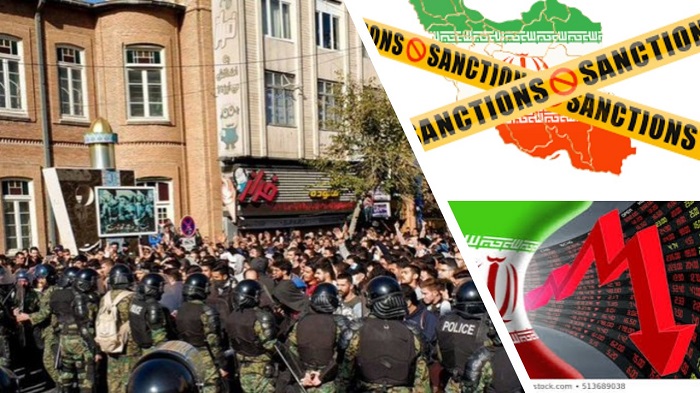
Iran Protests, sanctions, disaster economy, and low troop morale is crippling mullahs’ regime
February marks the 41st anniversary of the 1979 Revolution and subsequent rise to power of the mullahs’ regime in Iran. The clerical regime stages rallies and events every year in a transparent attempt to boost morale and gloss over the country’s growing international isolation.
The regime is faced with insurmountable crises both at home and abroad this year, which will likely lead to some over-the-top pageantry in a desperate attempt to hide the catastrophic state of affairs facing the mullahs.
The Iranian regime is failing on multiple levels, and it will struggle to conceal this widespread dysfunction as it celebrates 41 years in power.
Troop Morale
Troop morale is at an all-time low within the ranks of the Basij Force and Revolutionary Guards (IRGC). The regime’s proxy forces in the Middle East have been severely weakened due to U.S. sanctions, making the Basijis job of exporting terrorism much more difficult. Protesters in Iraq have called for the Iranian regime to cease its meddling in its country’s affairs, making the Basij Force deeply unpopular there. In addition, the Iranian people have become deeply resentful of the IRGC because of their violent suppression of protesters and have openly called for their dissolution.
Sanctions
A series of sanctions have had a crippling effect on the Iranian economy and increased its isolation from the international community. In March 2018 the U.S. announced that it was withdrawing from the Iran nuclear deal, triggering a progressive reinstatement of sanctions that effectively reduced Iranian oil exports to zero. Sanctions were expanded to apply to petrochemical products as well, crippling Iran’s top three industries.
Last Thursday the @StateDept announced the imposition of new sanctions against the #Iran regime’s Atomic Energy Organization, along with its Chief, Ali-Akbar Salehi.https://t.co/ZwtrRDPJqC#FreeIran2020 @USAdarFarsi #MEK pic.twitter.com/yVI03gyk1h
— MEK Iran (Mujahedin-e Khalq) (@MEK_Iran) February 1, 2020
The U.S. designated the IRGC, including the Quds Force and all of its commanders, as a Foreign Terrorist Organization (FTO), drastically reducing their ability to conduct business or conduct their activities with proxies.
The U.S. then placed Iranian regime Supreme Leader Ali Khamenei, President Hassan Rouhani, and Foreign Minister Javad Zarif on its terrorist list, further isolating the regime.
After 18 months of negotiations, the Iranian regime was unable to reach an agreement with the EU on INSTEX, a mechanism that would have allowed the regime to bypass U.S. oil sanctions in order to trade for food and humanitarian goods. The EU cited the regime’s lack of transparency in meeting its obligations under the FATF, an international anti-money laundering and terrorist group.
In January 2020 the Iranian regime completely withdrew from the 2015 Iran nuclear deal, which led the UK, France, and Germany to take steps toward triggering the agreement’s dispute mechanism. This final act may lead to the reimposition of pre-2015 U.N. sanctions and the complete isolation of the Iranian regime.
Legal/Political Consequences
The mullahs have relied on the international community to turn a blind eye to its crimes, but that pattern has begun to shift in favor of supporting the Iranian people and others who are threatened by the regime and its agents.
Two regime Intelligence agents were arrested in the U.S. in August 2018 for spying on the Mojahedin-e Khalq (PMOI/MEK Iran) members and convicted of acting as unregistered agents of a foreign government.
In December 2018 the Albanian government expelled the Iranian regime Ambassador and his deputy for attempting to bomb a Nowruz (Persian New Year) celebration held by the MEK Iran at their headquarters near Tirana. In January of this year, Albania expelled two more regime diplomats for “activity incompatible with their diplomatic status,” a phrase which is often used in cases of spying, according to a Reuters report.
Albania Closes Iranian Regime College and “Cultural Center” Headed by Expelled Diplomat https://t.co/qRfUYNGX47#Iran #Albania @USAdarFarsi #MEK
— MEK Iran (Mujahedin-e Khalq) (@MEK_Iran) January 25, 2020
European Parliament passed a resolution in support of the November Uprising on December 19, 2019, and condemned the violent crackdown on protesters.
The United States Congress followed suit with a unanimous resolution in the House of Representatives supporting the Iranian protesters and condemning the regime’s brutal crackdown. The resolution also condemned the regime’s terrorist plots against the MEK Iran.
The Economy
Iran’s economy is dismal and getting worse. Even before sanctions were reinstated, Iranians were in the streets protesting in the 2017/2018 Uprising about the regime’s mismanagement of the country’s wealth and resources. Economic concerns bring people into the streets to protest, but once they are there, they demand the end of the regime. 80% of the population live below the poverty line, and many are forced to dig through trash cans for food or sell their organs to meet their basic needs. Meanwhile, the regime spends billions funding endless proxy wars and exporting terrorism, and the IRGC controls 40% of the country’s economy.
Dr. Ali Safavi: The truth is that the #Iranian economy is heading for collapsehttps://t.co/rbpVeKnWLv#MEK #Iran ##FreeIran @USAdarFarsi pic.twitter.com/f5y41x0AQN
— MEK Iran (Mujahedin-e Khalq) (@MEK_Iran) October 31, 2019
There is no level of suppression that will prevent people from taking down a government that corrupts, and the mullahs know it. It is only a matter of time.
The Iranian People
The final and largest catastrophe facing the Iranian regime is the wrath of the Iranian people. The mullahs count on fear and suppression to keep the people from rebelling, but these tactics no longer work. People who eat out of garbage cans and risk being shot just for walking down the street during a protest become stronger, not weaker. Khamenei fails to understand his own people, and that will lead to his downfall.
Each protest adds fuel to the Resistance, and each act of suppression adds fire to the hearts of the Iranian people. One day soon the two will combine, and the regime will fall.
